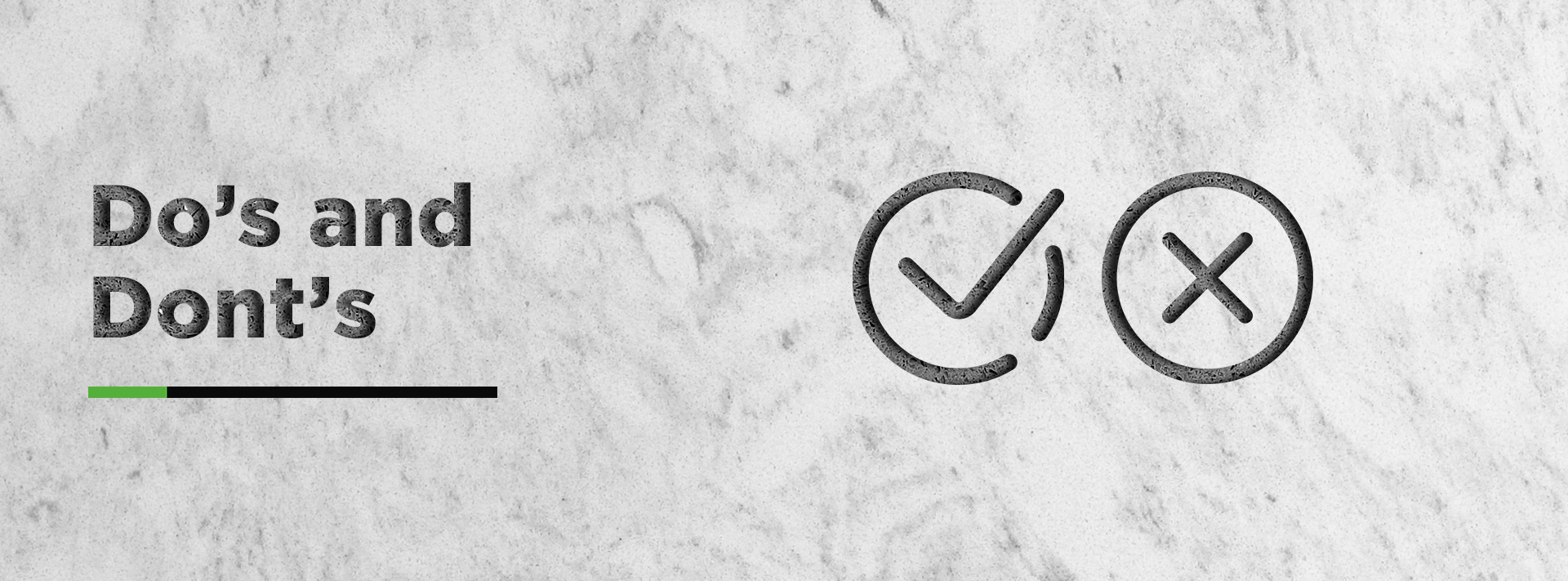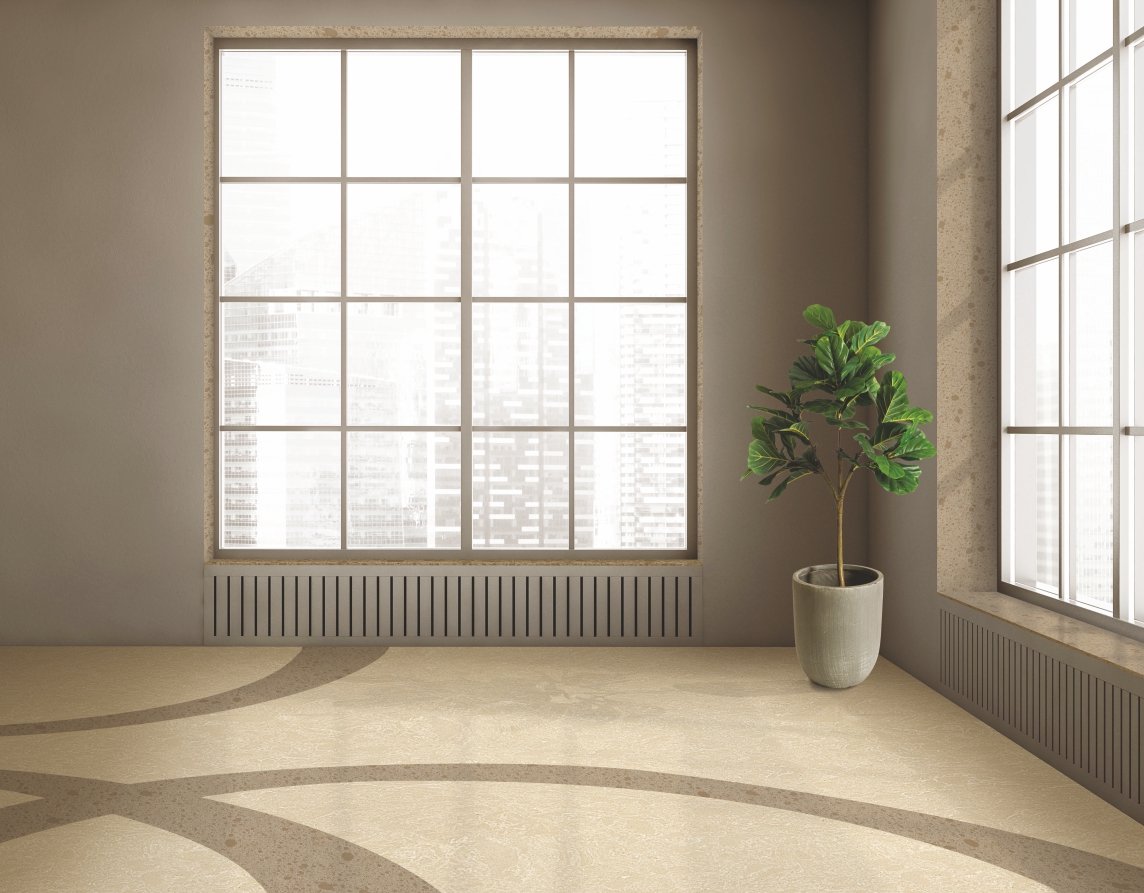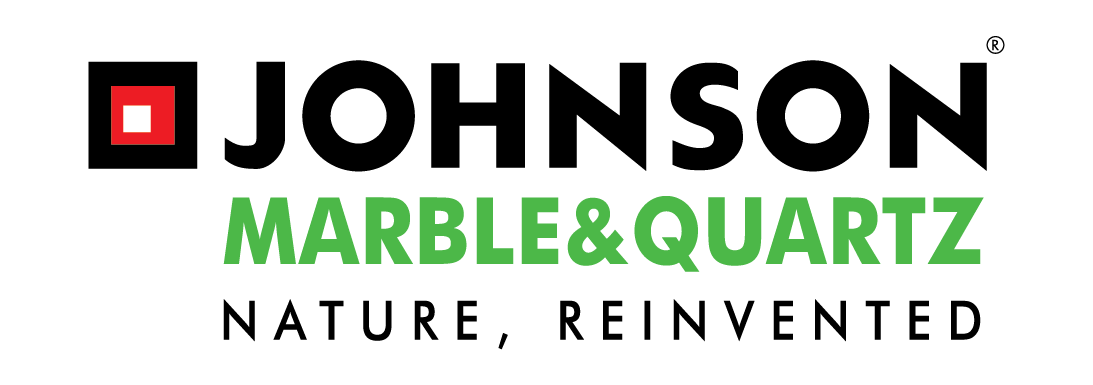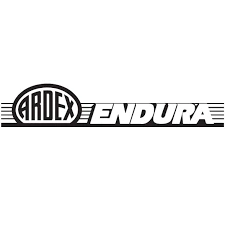
Dos and Don'ts
Johnson Engineered Stone Products are considered to be among the best alternatives to naturally available stones like marble and granite. Engineered stones are composite products that are compact, hard and enhanced. They can be supplied in the form of slabs, tiles, or special formats, and can be used in private, public and industrial sectors. Application areas include flooring, wall cladding, door jambs, window sills, bathroom vanity units, table-tops, etc.
Johnson Engineered Marble
Do not expose Johnson engineered marble surface to chemicals and solvents, especially paint removers or furniture strippers containing trichlorethane or methylene chloride.
Avoid contact with nail polish remover, bleach or cleansers that contain bleach, bluing, permanent markers or inks, and oil soaps. While casual exposure to alkaline materials will not damage, highly alkaline (high-pH) cleansers are not recommended when cleaning Johnson engineered marble.
- Johnson engineered marble floors should be cleaned thoroughly once a week; in high traffic areas floors should be cleaned daily with a clean, dry dust mop or soft bristle broom. Spills should be spottreated with the use of a damp mop or cloth towel and, if necessary, a small amount of mild soap or specialised (non-acidic / mild) stone cleaner.
- Floor machines like slow speed buffers or walk-behind scrubbers can be used on floors of larger commercial areas. Be sure to rinse thoroughly to remove any residue that may diminish the shine and beauty of the floor.
- (Do not use Acid while cleaning engineered marble.)
- Johnson engineered marble floors should be cleaned thoroughly once a week; in high traffic areas floors should be cleaned daily with a clean, dry dust mop or soft bristle broom. Spills should be spottreated with the use of a damp mop or cloth towel and, if necessary, a small amount of mild soap or specialised (non-acidic / mild) stone cleaner.
- Floor machines like slow speed buffers or walk-behind scrubbers can be used on floors of larger commercial areas. Be sure to rinse thoroughly to remove any residue that may diminish the shine and beauty of the floor.
- (Do not use Acid while cleaning engineered marble.)
- Johnson engineered marble floors should be cleaned thoroughly once a week; in high traffic areas floors should be cleaned daily with a clean, dry dust mop or soft bristle broom. Spills should be spottreated with the use of a damp mop or cloth towel and, if necessary, a small amount of mild soap or specialised (non-acidic / mild) stone cleaner.
- Floor machines like slow speed buffers or walk-behind scrubbers can be used on floors of larger commercial areas. Be sure to rinse thoroughly to remove any residue that may diminish the shine and beauty of the floor.
- (Do not use Acid while cleaning engineered marble.)


Johnson Engineered Quartz
Johnson Engineered Quartz is a high quality solid, non-porous product that is resistant to scratches, heat, and stain; it requires minimum maintenance. However, it is not heat, stain and scratch proof and requires regular care to keep it in immaculate condition for years.
- Always keep the engineered quartz surfaces clean of dust, sand and soil on a daily basis by sweeping with a soft brush and, when necessary, with a machine. The surfaces can be easily cleaned with warm water and a mild household detergent, using a standard mop. Make sure the floor is well rinsed and is completely dry before allowing people to walk on it.
- Honed finish surfaces require more maintenance and care than the polished surfaces. The exposed area of a honed finish is larger than the polished surface; hence any dirt, markings and scratches would be more obvious on a honed finish surface. These markings can be removed using non-abrasive cleaning products.
- Engineered quartz can get permanently damaged by prolonged exposure to strong chemicals and solvents. It is advisable not to use hydrofluoric acid, any product containing trichlorethane or methylene chloride, and paint strippers. You can clean the surface with detergents that have a pH level no higher than 11 (avoid caustic soda) or with acidic detergents for persistent grime (no lower than pH3). A stone sealer/impregnator can be used for lighter colors.
- Always keep the engineered quartz surfaces clean of dust, sand and soil on a daily basis by sweeping with a soft brush and, when necessary, with a machine. The surfaces can be easily cleaned with warm water and a mild household detergent, using a standard mop. Make sure the floor is well rinsed and is completely dry before allowing people to walk on it.
- Honed finish surfaces require more maintenance and care than the polished surfaces. The exposed area of a honed finish is larger than the polished surface; hence any dirt, markings and scratches would be more obvious on a honed finish surface. These markings can be removed using non-abrasive cleaning products.
- Engineered quartz can get permanently damaged by prolonged exposure to strong chemicals and solvents. It is advisable not to use hydrofluoric acid, any product containing trichlorethane or methylene chloride, and paint strippers. You can clean the surface with detergents that have a pH level no higher than 11 (avoid caustic soda) or with acidic detergents for persistent grime (no lower than pH3). A stone sealer/impregnator can be used for lighter colors.
- Always keep the engineered quartz surfaces clean of dust, sand and soil on a daily basis by sweeping with a soft brush and, when necessary, with a machine. The surfaces can be easily cleaned with warm water and a mild household detergent, using a standard mop. Make sure the floor is well rinsed and is completely dry before allowing people to walk on it.
- Honed finish surfaces require more maintenance and care than the polished surfaces. The exposed area of a honed finish is larger than the polished surface; hence any dirt, markings and scratches would be more obvious on a honed finish surface. These markings can be removed using non-abrasive cleaning products.
- Engineered quartz can get permanently damaged by prolonged exposure to strong chemicals and solvents. It is advisable not to use hydrofluoric acid, any product containing trichlorethane or methylene chloride, and paint strippers. You can clean the surface with detergents that have a pH level no higher than 11 (avoid caustic soda) or with acidic detergents for persistent grime (no lower than pH3). A stone sealer/impregnator can be used for lighter colors.
- Always keep the engineered quartz surfaces clean of dust, sand and soil on a daily basis by sweeping with a soft brush and, when necessary, with a machine. The surfaces can be easily cleaned with warm water and a mild household detergent, using a standard mop. Make sure the floor is well rinsed and is completely dry before allowing people to walk on it.
- Honed finish surfaces require more maintenance and care than the polished surfaces. The exposed area of a honed finish is larger than the polished surface; hence any dirt, markings and scratches would be more obvious on a honed finish surface. These markings can be removed using non-abrasive cleaning products.
- Engineered quartz can get permanently damaged by prolonged exposure to strong chemicals and solvents. It is advisable not to use hydrofluoric acid, any product containing trichlorethane or methylene chloride, and paint strippers. You can clean the surface with detergents that have a pH level no higher than 11 (avoid caustic soda) or with acidic detergents for persistent grime (no lower than pH3). A stone sealer/impregnator can be used for lighter colors.






